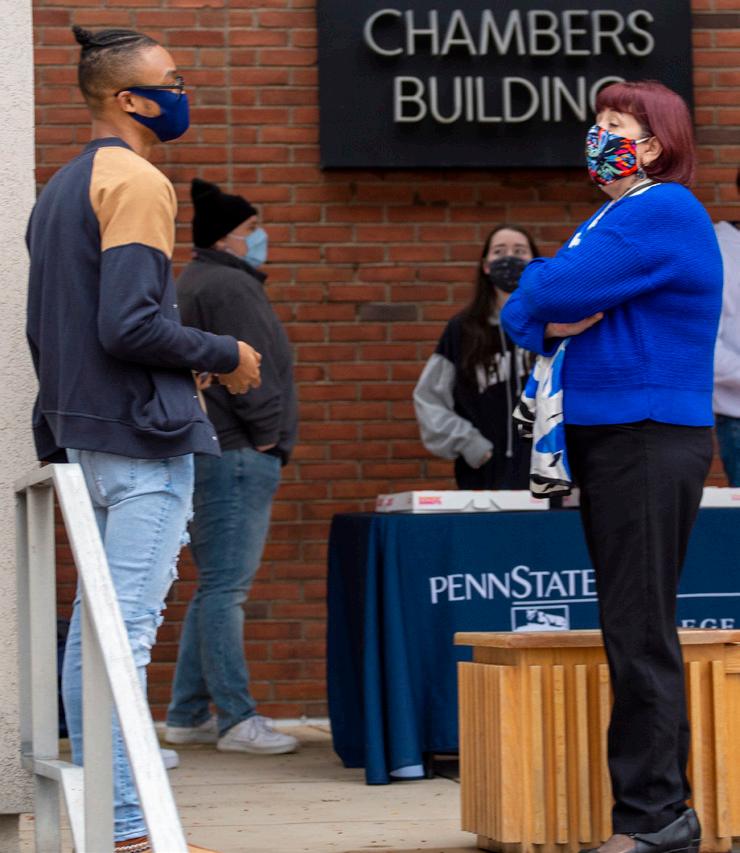
2 minute read
Office reorganization enhances commitment to equity and inclusion
By Jim Carlson
The newly named Office of Education and Social Equity (OESE) has the same mission of being committed to providing historically underserved/minoritized students the support, opportunities and resources that enhance their educational experience and facilitate their academic well-being.
Assistant Dean María Schmidt said the new name (formerly the Office of Multicultural Programs) reflects more accurately current operations as well as the evolution and growth of the office and the Penn State College of Education regarding its equity and inclusion work.
Assistant Dean María Schmidt, right, oversees the Office of Education and Social Equity and says the work is performed by “a team of exceptional individuals.”
Photo: Annemarie Mountz
“The reorganization presents a multidimensional approach with greater operational coordination and collaboration across groups, units and leadership team that will strengthen our service to all students and the college community,” Schmidt said. “Our intention is to take a more holistic, strategic and systematic approach around initiatives, collaborations and services while increasing the efficiency and effectiveness of our human and financial resources.”
Schmidt’s office will support and advise justiceoriented, equity-based initiatives in the college. It also will oversee the development, maintenance and oversight for the Leadership in Equity Fund, which will support both faculty- and staff-initiated projects with the goal of expanding and deepening equity-minded practices in teaching and research within the college.
Schmidt works directly with Brenda Martinez, student advocacy specialist, and David Borges, administrative support coordinator. But there also is a “team of people,” she said, that develop and implement the initiatives, partnerships and collaborations under the office umbrella.
The program and initiatives team consists of assistant professors Efraín Marimón and Ashley Patterson and postdoctoral scholar Gabby Medina Falzone. Graduate assistants who work with varying initiatives are Carlos Medina, Kaela Fuentes-Packnick, Hassani Jack, Trinity Middlebrooks, Diana Gallardo and Rhea Banerjee.
Schmidt said that throughout her career, she has had the privilege of working with extraordinary young people determined to overcome obstacles created by systemic inequities, engaging in their education and cultivating their own potential. “This privilege is also an ethical and moral responsibility to, at least, attempt to be an agent of change for them,” she said.
“Disrupting systemic barriers and translating change into reality is a slow, never-ending process requiring continuous and sustained work. Throughout my career, those same students have provided me the inspiration and the source of energy to continue and to sustain the work. The most meaningful part of my work is to see them grow through their education journey.”
OESE’s goals range from increasing the number of minoritized students who earn bachelor’s, master’s and doctoral degrees as well as certification in continuing education programs in the College of Education, to assisting students in procuring resources to finance their education, to creating a supportive climate for marginalized students, among others.
Some of its collaborative partners within the college include the Center for the Study of Higher Education, the Center for Education and Civil Rights and the Restorative Justice Initiative.
Schmidt stressed that the work carried out by the OESE is a collective achievement. “The work is accomplished thanks to a team of exceptional individuals, past and present, with unmatched commitment to our students and to the work,” she said.
“Charleon Jeffries … Gary Abdullah … Brenda Martinez and the many doctoral and master’s students who I had/have the fortune to work with and have in my life. We have a common thread — we will never be fully satisfied; there is still much to do, the work is not completed.”









